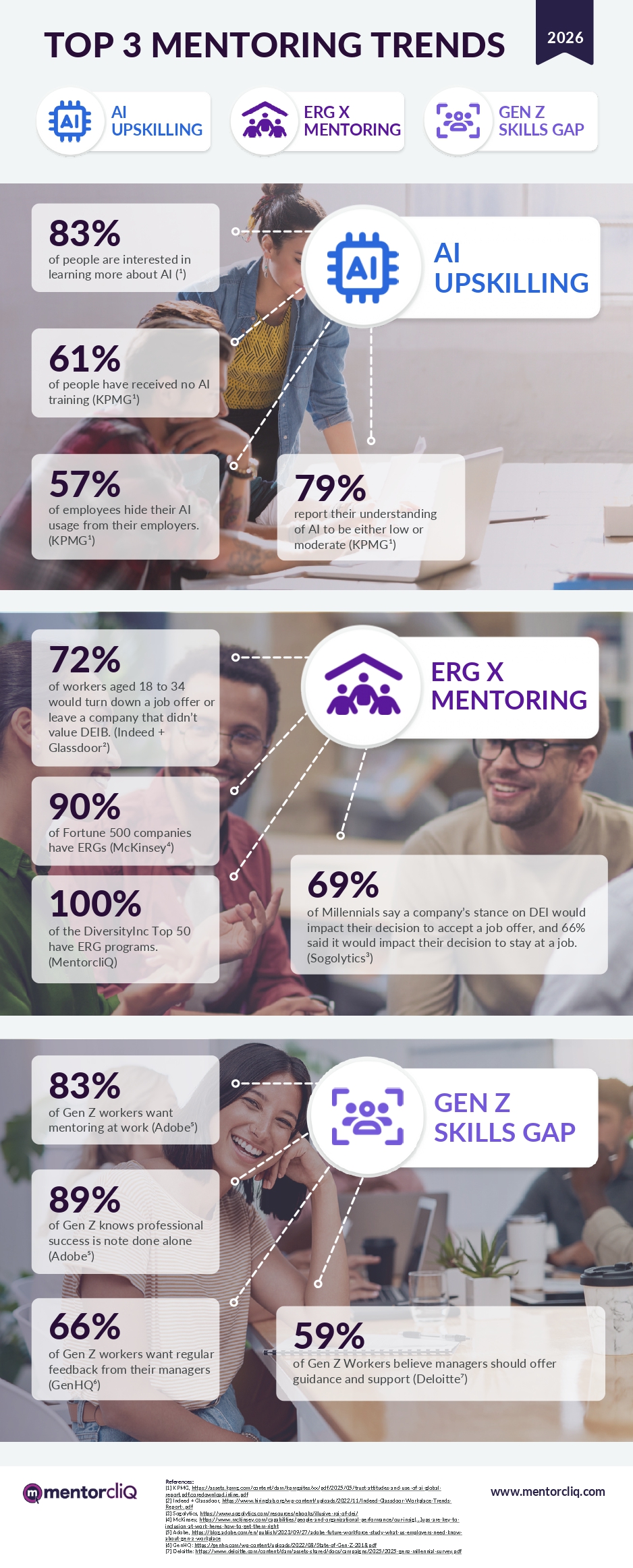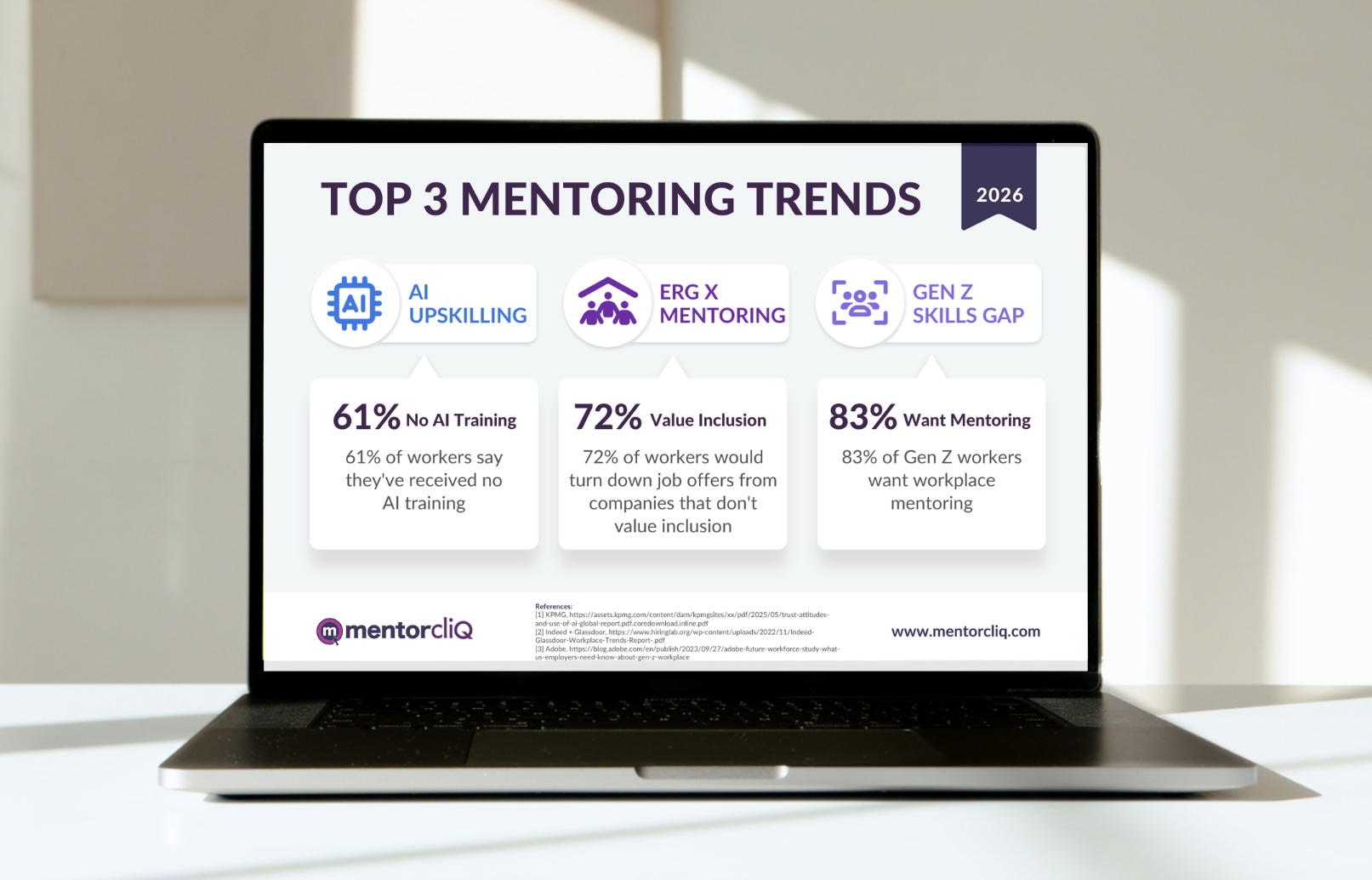Mentoring trends can change dramatically year-to-year, driven heavily by shifting forces in the workforce. 2026 is one of those years where mentoring trends have shifted in dramatic fashion due to a notable upheaval in both political and economic environments.
As 2025 progressed, three major issues have become evident: The need for AI skill development, the continuing struggles of Gen Z workers, and major pivots within corporate DEI. MentorcliQ follows trends like these closely, and in 2026, we believe these are three employee engagement and development issues that will come to the forefront. We also believe that mentoring offers a solid solution to many of the problems that underlie these trends.
You can explore our deeper dive into each of these trends and how mentoring creates a viable path forward in each one:
- AI Upskilling Will Be a Non-Negotiable
- ERG Mentoring Will Help Build Inclusive Culture Amidst Political Uncertainty
- Solving the Gen Z Skills Gap Crisis
As a “geriatric Millennial,” I’m still young enough to have many years left in the workforce, but old enough to have seen wild shifts in workforce dynamics and development needs. However, the years following 2020 have given me and many others absolute whiplash with the numerous inconsistencies. Every year appears to bring new challenges, either for workers or businesses (or both).
Yet 2026 just feels different. AI existed before 2026, yet the rapid improvement of the tools in just the past year proves that AI skills are now essential for everyone, despite how many people have yet to adopt those skills. And while my career developed during the highlight of the DEI movement, the retraction in 2025 and going into 2026 is like nothing I’ve witnessed. And then there’s Gen Z, which may be perhaps the most lamentable generation since over 50 years… which is a lot coming from someone within what Washington Post journalist Andrew Van Dam called “The unluckiest generation in US history.”
While we don’t consider ourselves Nostradamuses of Talent Development, we work with hundreds of organizations. MentorcliQ is also the largest mentoring software provider to Fortune 500 companies, giving us a unique perspective of employee engagement, development, and retention at the macro level. There are many struggles on the horizon for everyone, but there are also viable strategies that can create an advantage for creative HR leaders.
Top 3 Mentoring Trends to Watch in 2026
Mentoring Trend #1: AI Upskilling 🤖
First is the biggest elephant in the room: AI skill development.
I was an early adopter of generative AI several years ago. Since then, all kinds of AI tools have emerged, but generative AI, in particular (think ChatGPT, Claude, Perplexity, Gemini, etc.) has been more disruptive than most people realized it would be.
Companies are rushing to incorporate AI into their day-to-day operations, but there has been very little focus on upskilling existing workers to become effective users of AI tools. The coming year will be a critical moment for both businesses and workers, as the integration of AI accelerates even faster in 2026.
Mentoring Trend #2: ERG x Mentoring 🫱🏿🫲🏻
Next up on our list is inclusion. Or, that increasingly dirty word, “DEI.”
Inclusion has been one of the most emotionally and stressful topics for companies in today’s politically tenuous environment. Most leaders still recognize the value in having an inclusive and diverse workforce, and most workers want to see this value held by their companies. Yet the political environment has changed the way in which companies execute on DEI.
Their ability to be totally inclusive of everyone means ERGs will continue to be an acceptable DEI strategy, and companies will begin recognizing that layering mentoring on top of ERGs will create more organic inclusion pathways that don’t rely on heavy-handed mandates.
Mentoring Trend #3: Gen Z Skills Gap 😫
Our trends have no particular order, so being “third” does not mean we consider this trend less than the others. If anything, Gen Z’s looming skills gap crisis is the most important trend we’ve seen in years solely due to the large human and economic impact it’s causing.
Gen Z workers are struggling to find work and falling even further behind in skill development as entry-level roles evaporate. Businesses are focusing their hiring efforts on workers with more years of experience than Gen Z can reasonably obtain. This is creating a negative feedback loop wherein Gen Z workers who can’t find work fall further and further behind.
This is leaving many Gen Z workers without a way to enter the workforce at all, creating a dire skills and experience gap that will only widen without conscious effort from businesses willing to think long-term and invest in the future workforce.
Mentoring Trends Infographic (click to download PDF version)

Get Ahead of 2026 Mentoring Trends
Taking note of trends in employee engagement is important. Taking action, however, is far more important. Employees may stay put during tough economic times out of uncertainty. That’s what we saw in 2025 and will likely continue to see in 2026. But a lack of engagement and development may sour them on your organization and push them to quit at the first, best opportunity.
Be the trendsetter. Learn more about how mentoring can increase productivity, bring measurable results to ERGs, and help add the human touch back to upskilling after you…




